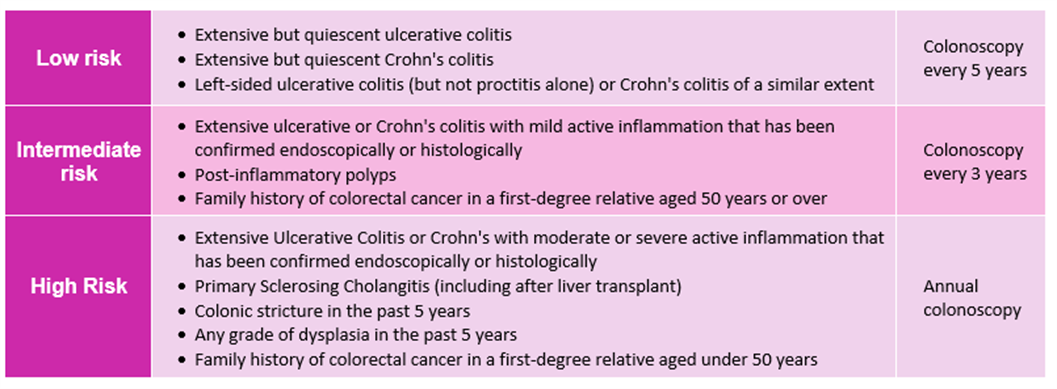INFLAMMATORY BOWEL DISEASE: COLORECTAL CANCER
Patients with IBD have an increased risk of bowel cancer, particularly in those with more extensive or active disease.
The risk of developing colorectal cancer for people with Ulcerative Colitis is estimated as after 10 years of disease 2%
after 20 years of disease 8%
after 30 years of disease 18%
The risk of developing colorectal cancer for people with Crohn's disease is similar to that for patients with Ulcerative Colitis with the same extent of colonic involvement.
For patients with Ulcerative Colitis or Crohn's Colitis
involving more than one segment of colon,
surveillance should begin 10 years after diagnosis
and be repeated every 3-5 years
unless there are specific risk factors including
primary sclerosing cholangitis
or a strong family history of colorectal cancer
(see table below, taken from NICE CG118).
Don’t forget that patients with IBD who are outside the NICE NG12 age-related guidance may develop bowel cancer.
The risk of developing colorectal cancer for people with Ulcerative Colitis is estimated as after 10 years of disease 2%
after 20 years of disease 8%
after 30 years of disease 18%
The risk of developing colorectal cancer for people with Crohn's disease is similar to that for patients with Ulcerative Colitis with the same extent of colonic involvement.
For patients with Ulcerative Colitis or Crohn's Colitis
involving more than one segment of colon,
surveillance should begin 10 years after diagnosis
and be repeated every 3-5 years
unless there are specific risk factors including
primary sclerosing cholangitis
or a strong family history of colorectal cancer
(see table below, taken from NICE CG118).
Don’t forget that patients with IBD who are outside the NICE NG12 age-related guidance may develop bowel cancer.
Amy Redhead died aged 28 on February 15th 2018; Her sister Emily writes
For people who are not in these high-risk groups,
The NHS Bowel Cancer Screening Programme offers screening using
Faecal occult blood testing every 2 years
to all men and women aged 60–74 years.
The NHS Bowel Cancer Screening Programme offers screening using
Faecal occult blood testing every 2 years
to all men and women aged 60–74 years.



